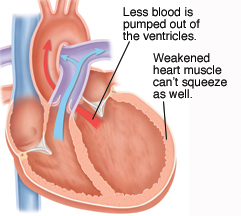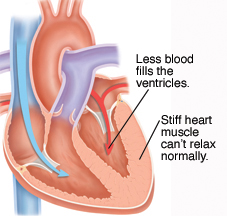Heart Failure
What is heart failure?
The heart is a muscle that pumps oxygen-rich blood to all parts of the body. When you have heart failure, the heart is not able to pump as well as it should. Blood and fluid may back up into the lungs, and some parts of the body may not get enough oxygen-rich blood to work normally. These problems lead to the symptoms you feel.
With heart failure, not enough oxygen-rich blood leaves the heart with each beat. There are two types of heart failure. Both affect the ventricles’ ability to pump blood. You may have one or both types.

Systolic heart failure. The heart muscle becomes weak and enlarged. It can’t pump enough oxygen-rich blood forward to the rest of the body when the ventricles contract. This can cause blood to back up into the lungs and cause shortness of breath and eventually ankle swelling (edema).

Diastolic heart failure. The heart muscle becomes stiff. It doesn’t relax normally between contractions, which keeps the ventricles from filling with blood. This can lead to the backup of blood into the body and affect organs such as the liver.
Heart failure symptoms
When you have heart failure, you need to pay close attention to your body and how you feel, every single day. That way, if a problem occurs, you can get help before it becomes too severe. You'll need to watch for changes in your symptoms. As long as symptoms stay about the same from one day to the next, your heart failure is stable. But if symptoms start to get worse, it's time to take action.
Signs and symptoms of worsening heart failure include:
- Rapid weight gain
- Shortness of breath
- Swelling
- Fatigue
How heart failure affects your body
When the heart doesn't pump enough blood, hormones are sent to increase the amount of work the heart does. Some hormones make the heart grow larger. Others tell the heart to pump faster. As a result, the heart may pump more blood at first, but it can't keep up with the ongoing demands. So, the heart muscle becomes even more weak. Over time, even less blood is pumped through the heart. This leads to problems throughout the body as organs began to feel the effects of a long-term lack of oxygen. Eventually, if untreated, this can cause problems with your lungs, liver and kidneys; loss of elasticity in the skin; and skin changes in the lower legs. A weak heart can eventually cause a severe decline in health and possible death if left untreated.
Treatment for heart failure
Our cardiologists are experts in treating heart failure, allowing you to experience greater independence and symptom relief. Our goal is to help you feel better while living with the disease.
Heart failure requires long-term care and monitoring. You will receive outstanding care at all our hospitals and physician offices, which makes it convenient for you to get the care you need, close to home.
If you need more specialized cardiac care, you have access to services at our Heart and Vascular Center, located at our Medical Center in Worcester, MA. Through our Heart Failure Program and our Cardiac Resynchronization Therapy Clinic, we offer you the most promising treatment options available for heart failure.